Analysis of Mental Health Practice and Medical Racism Impact Essay
VerifiedAdded on 2020/05/04
|5
|1129
|87
Essay
AI Summary
This essay examines the pervasive effects of medical racism on healthcare practices and outcomes. It explores how systemic biases and institutional structures contribute to disparities in access to care and treatment recommendations, particularly for minority groups. The essay highlights instances of racial discrimination in medical settings, including historical examples like the Tuskegee Syphilis Study and contemporary issues such as unequal access to treatments. It emphasizes the need for universal healthcare approaches that prioritize individual patient needs over racial classifications, advocating for collaboration among medical institutions to provide equitable and standardized care. The essay concludes by underscoring the potential for stressful experiences resulting from racial discrimination to exacerbate health complications, urging healthcare providers to address biases and promote equitable practices to improve mental health outcomes for all.
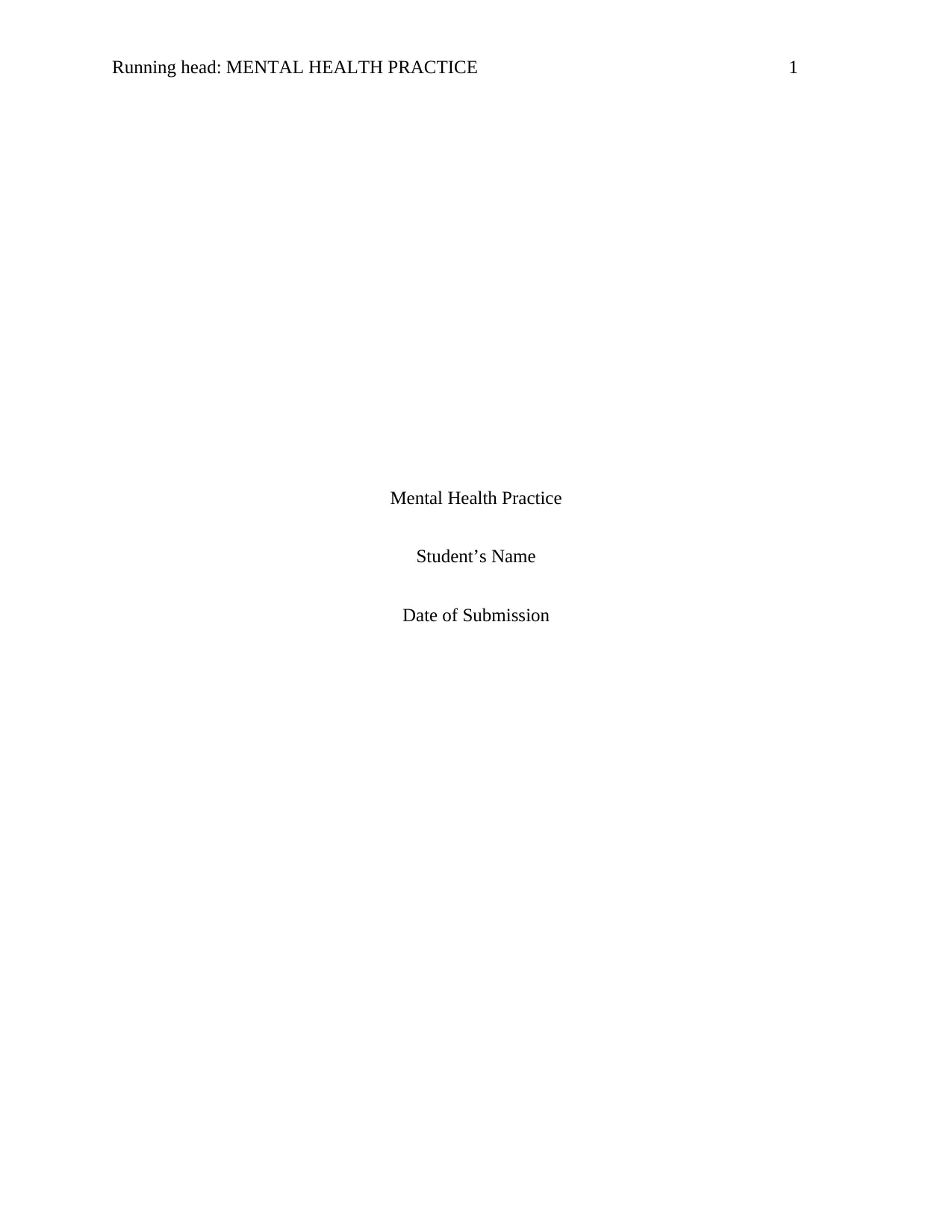
Running head: MENTAL HEALTH PRACTICE 1
Mental Health Practice
Student’s Name
Date of Submission
Mental Health Practice
Student’s Name
Date of Submission
Paraphrase This Document
Need a fresh take? Get an instant paraphrase of this document with our AI Paraphraser
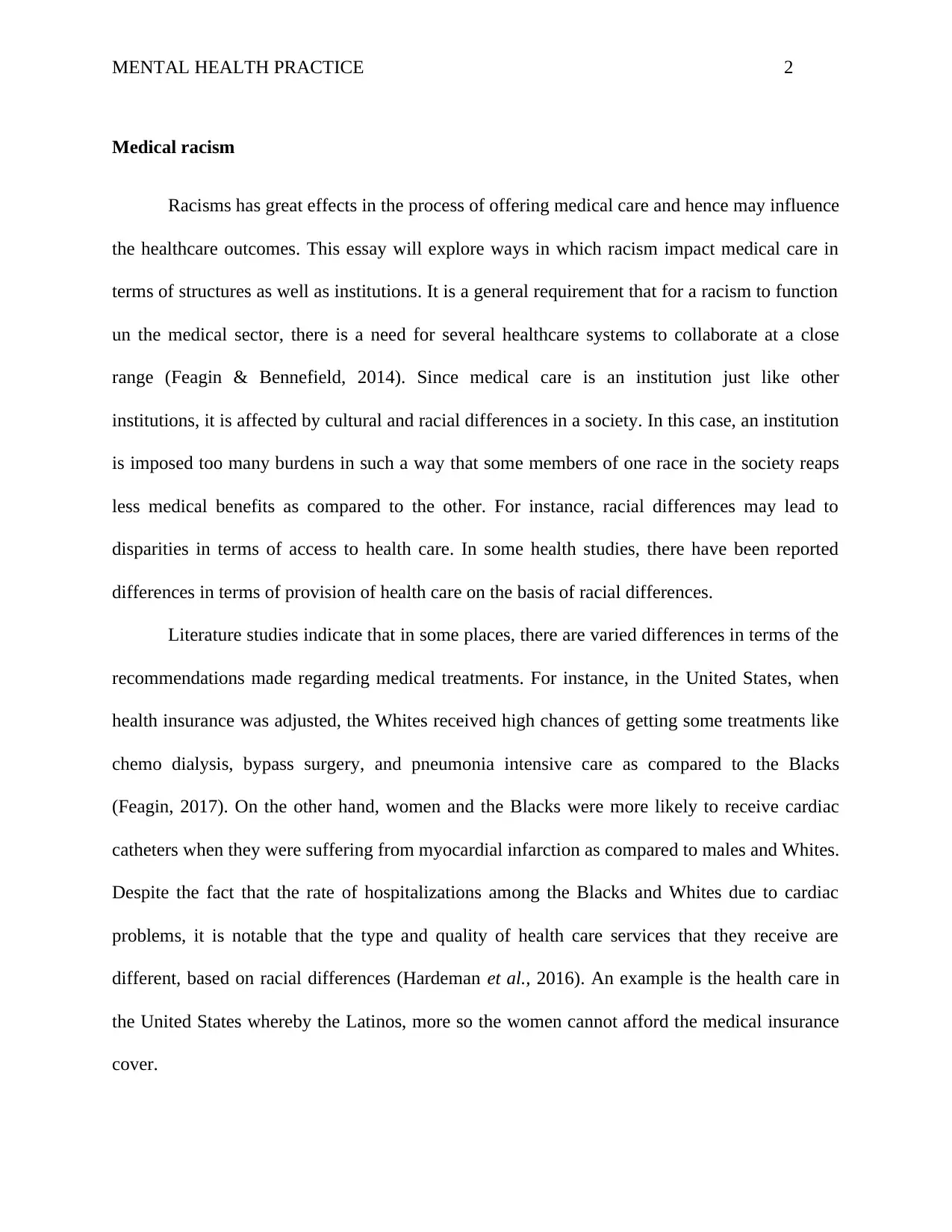
MENTAL HEALTH PRACTICE 2
Medical racism
Racisms has great effects in the process of offering medical care and hence may influence
the healthcare outcomes. This essay will explore ways in which racism impact medical care in
terms of structures as well as institutions. It is a general requirement that for a racism to function
un the medical sector, there is a need for several healthcare systems to collaborate at a close
range (Feagin & Bennefield, 2014). Since medical care is an institution just like other
institutions, it is affected by cultural and racial differences in a society. In this case, an institution
is imposed too many burdens in such a way that some members of one race in the society reaps
less medical benefits as compared to the other. For instance, racial differences may lead to
disparities in terms of access to health care. In some health studies, there have been reported
differences in terms of provision of health care on the basis of racial differences.
Literature studies indicate that in some places, there are varied differences in terms of the
recommendations made regarding medical treatments. For instance, in the United States, when
health insurance was adjusted, the Whites received high chances of getting some treatments like
chemo dialysis, bypass surgery, and pneumonia intensive care as compared to the Blacks
(Feagin, 2017). On the other hand, women and the Blacks were more likely to receive cardiac
catheters when they were suffering from myocardial infarction as compared to males and Whites.
Despite the fact that the rate of hospitalizations among the Blacks and Whites due to cardiac
problems, it is notable that the type and quality of health care services that they receive are
different, based on racial differences (Hardeman et al., 2016). An example is the health care in
the United States whereby the Latinos, more so the women cannot afford the medical insurance
cover.
Medical racism
Racisms has great effects in the process of offering medical care and hence may influence
the healthcare outcomes. This essay will explore ways in which racism impact medical care in
terms of structures as well as institutions. It is a general requirement that for a racism to function
un the medical sector, there is a need for several healthcare systems to collaborate at a close
range (Feagin & Bennefield, 2014). Since medical care is an institution just like other
institutions, it is affected by cultural and racial differences in a society. In this case, an institution
is imposed too many burdens in such a way that some members of one race in the society reaps
less medical benefits as compared to the other. For instance, racial differences may lead to
disparities in terms of access to health care. In some health studies, there have been reported
differences in terms of provision of health care on the basis of racial differences.
Literature studies indicate that in some places, there are varied differences in terms of the
recommendations made regarding medical treatments. For instance, in the United States, when
health insurance was adjusted, the Whites received high chances of getting some treatments like
chemo dialysis, bypass surgery, and pneumonia intensive care as compared to the Blacks
(Feagin, 2017). On the other hand, women and the Blacks were more likely to receive cardiac
catheters when they were suffering from myocardial infarction as compared to males and Whites.
Despite the fact that the rate of hospitalizations among the Blacks and Whites due to cardiac
problems, it is notable that the type and quality of health care services that they receive are
different, based on racial differences (Hardeman et al., 2016). An example is the health care in
the United States whereby the Latinos, more so the women cannot afford the medical insurance
cover.
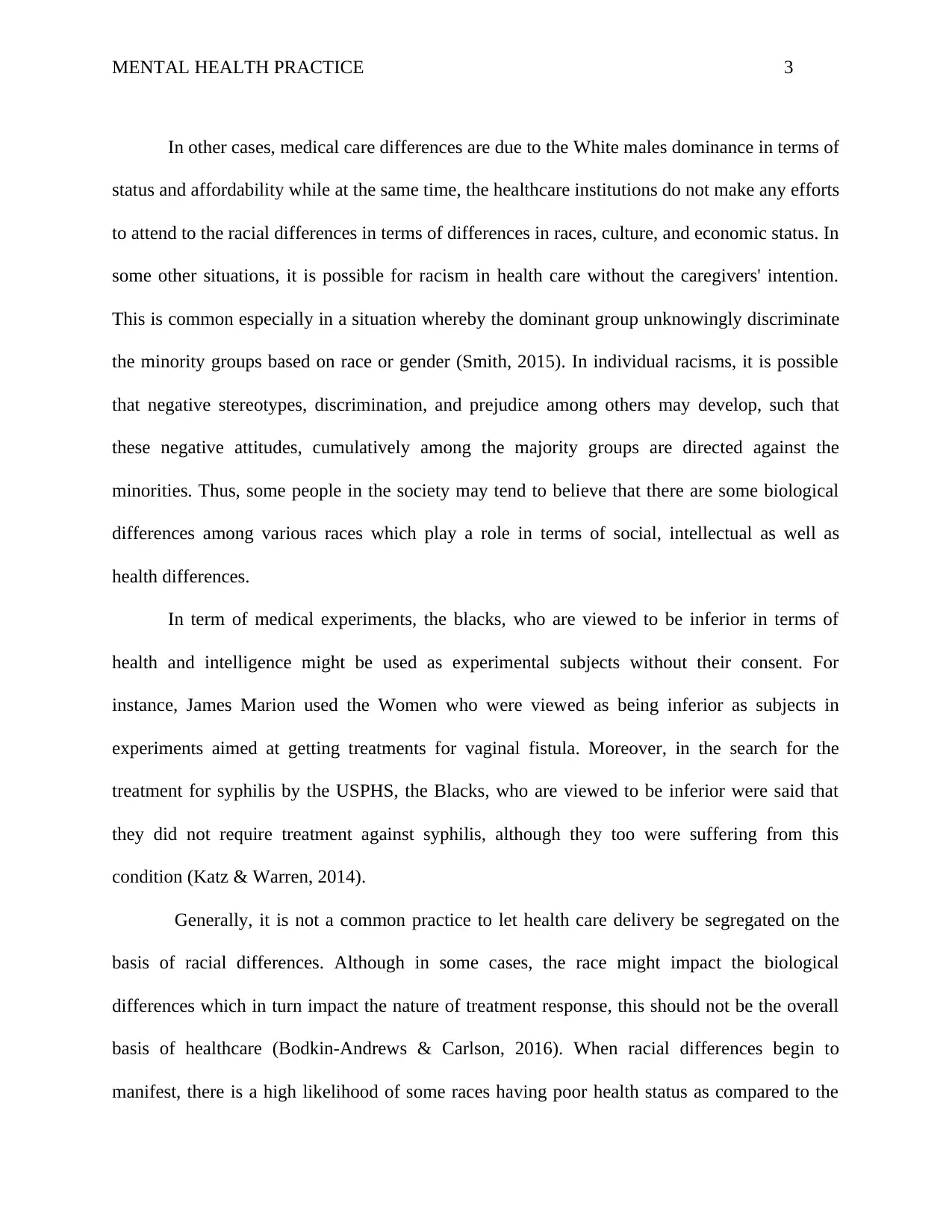
MENTAL HEALTH PRACTICE 3
In other cases, medical care differences are due to the White males dominance in terms of
status and affordability while at the same time, the healthcare institutions do not make any efforts
to attend to the racial differences in terms of differences in races, culture, and economic status. In
some other situations, it is possible for racism in health care without the caregivers' intention.
This is common especially in a situation whereby the dominant group unknowingly discriminate
the minority groups based on race or gender (Smith, 2015). In individual racisms, it is possible
that negative stereotypes, discrimination, and prejudice among others may develop, such that
these negative attitudes, cumulatively among the majority groups are directed against the
minorities. Thus, some people in the society may tend to believe that there are some biological
differences among various races which play a role in terms of social, intellectual as well as
health differences.
In term of medical experiments, the blacks, who are viewed to be inferior in terms of
health and intelligence might be used as experimental subjects without their consent. For
instance, James Marion used the Women who were viewed as being inferior as subjects in
experiments aimed at getting treatments for vaginal fistula. Moreover, in the search for the
treatment for syphilis by the USPHS, the Blacks, who are viewed to be inferior were said that
they did not require treatment against syphilis, although they too were suffering from this
condition (Katz & Warren, 2014).
Generally, it is not a common practice to let health care delivery be segregated on the
basis of racial differences. Although in some cases, the race might impact the biological
differences which in turn impact the nature of treatment response, this should not be the overall
basis of healthcare (Bodkin-Andrews & Carlson, 2016). When racial differences begin to
manifest, there is a high likelihood of some races having poor health status as compared to the
In other cases, medical care differences are due to the White males dominance in terms of
status and affordability while at the same time, the healthcare institutions do not make any efforts
to attend to the racial differences in terms of differences in races, culture, and economic status. In
some other situations, it is possible for racism in health care without the caregivers' intention.
This is common especially in a situation whereby the dominant group unknowingly discriminate
the minority groups based on race or gender (Smith, 2015). In individual racisms, it is possible
that negative stereotypes, discrimination, and prejudice among others may develop, such that
these negative attitudes, cumulatively among the majority groups are directed against the
minorities. Thus, some people in the society may tend to believe that there are some biological
differences among various races which play a role in terms of social, intellectual as well as
health differences.
In term of medical experiments, the blacks, who are viewed to be inferior in terms of
health and intelligence might be used as experimental subjects without their consent. For
instance, James Marion used the Women who were viewed as being inferior as subjects in
experiments aimed at getting treatments for vaginal fistula. Moreover, in the search for the
treatment for syphilis by the USPHS, the Blacks, who are viewed to be inferior were said that
they did not require treatment against syphilis, although they too were suffering from this
condition (Katz & Warren, 2014).
Generally, it is not a common practice to let health care delivery be segregated on the
basis of racial differences. Although in some cases, the race might impact the biological
differences which in turn impact the nature of treatment response, this should not be the overall
basis of healthcare (Bodkin-Andrews & Carlson, 2016). When racial differences begin to
manifest, there is a high likelihood of some races having poor health status as compared to the
⊘ This is a preview!⊘
Do you want full access?
Subscribe today to unlock all pages.

Trusted by 1+ million students worldwide
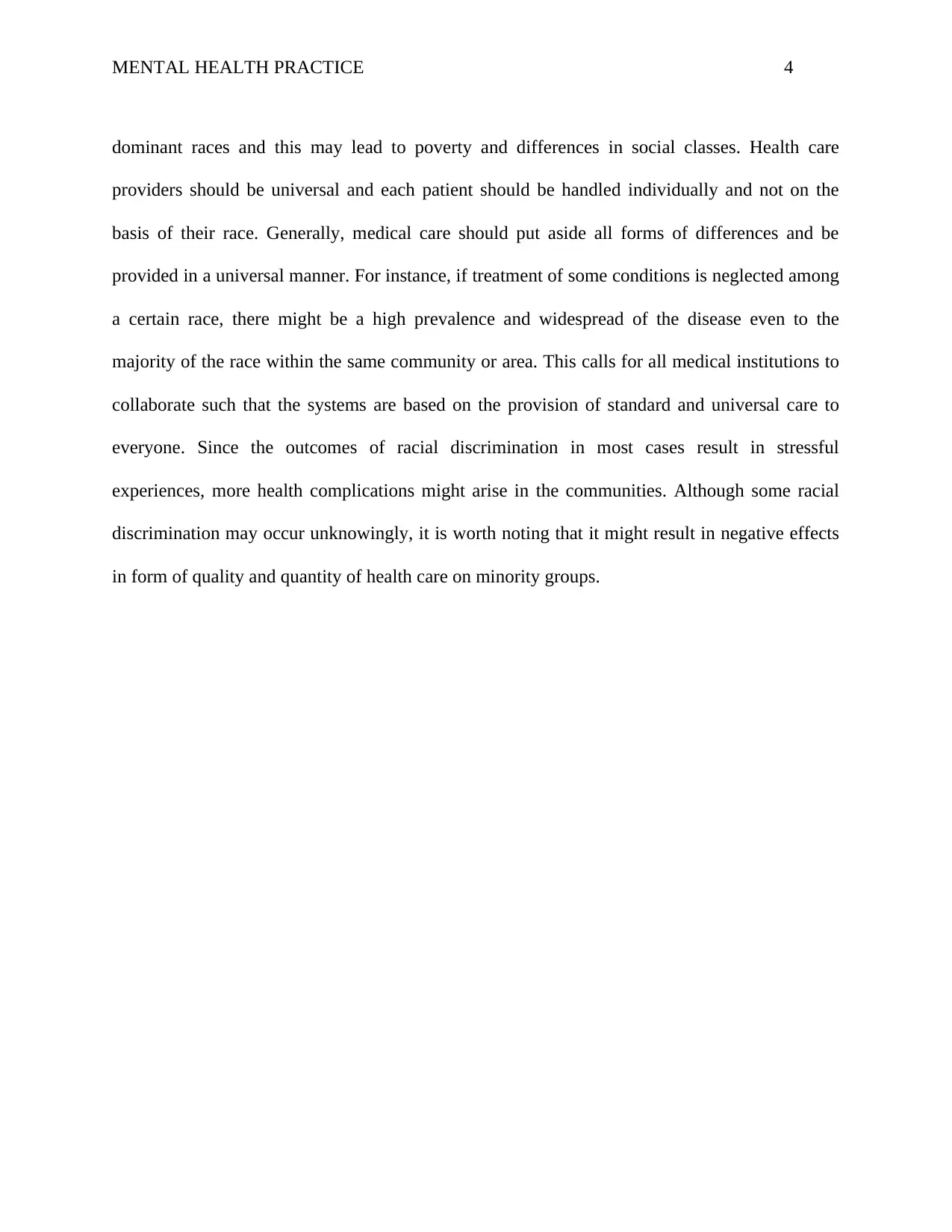
MENTAL HEALTH PRACTICE 4
dominant races and this may lead to poverty and differences in social classes. Health care
providers should be universal and each patient should be handled individually and not on the
basis of their race. Generally, medical care should put aside all forms of differences and be
provided in a universal manner. For instance, if treatment of some conditions is neglected among
a certain race, there might be a high prevalence and widespread of the disease even to the
majority of the race within the same community or area. This calls for all medical institutions to
collaborate such that the systems are based on the provision of standard and universal care to
everyone. Since the outcomes of racial discrimination in most cases result in stressful
experiences, more health complications might arise in the communities. Although some racial
discrimination may occur unknowingly, it is worth noting that it might result in negative effects
in form of quality and quantity of health care on minority groups.
dominant races and this may lead to poverty and differences in social classes. Health care
providers should be universal and each patient should be handled individually and not on the
basis of their race. Generally, medical care should put aside all forms of differences and be
provided in a universal manner. For instance, if treatment of some conditions is neglected among
a certain race, there might be a high prevalence and widespread of the disease even to the
majority of the race within the same community or area. This calls for all medical institutions to
collaborate such that the systems are based on the provision of standard and universal care to
everyone. Since the outcomes of racial discrimination in most cases result in stressful
experiences, more health complications might arise in the communities. Although some racial
discrimination may occur unknowingly, it is worth noting that it might result in negative effects
in form of quality and quantity of health care on minority groups.
Paraphrase This Document
Need a fresh take? Get an instant paraphrase of this document with our AI Paraphraser
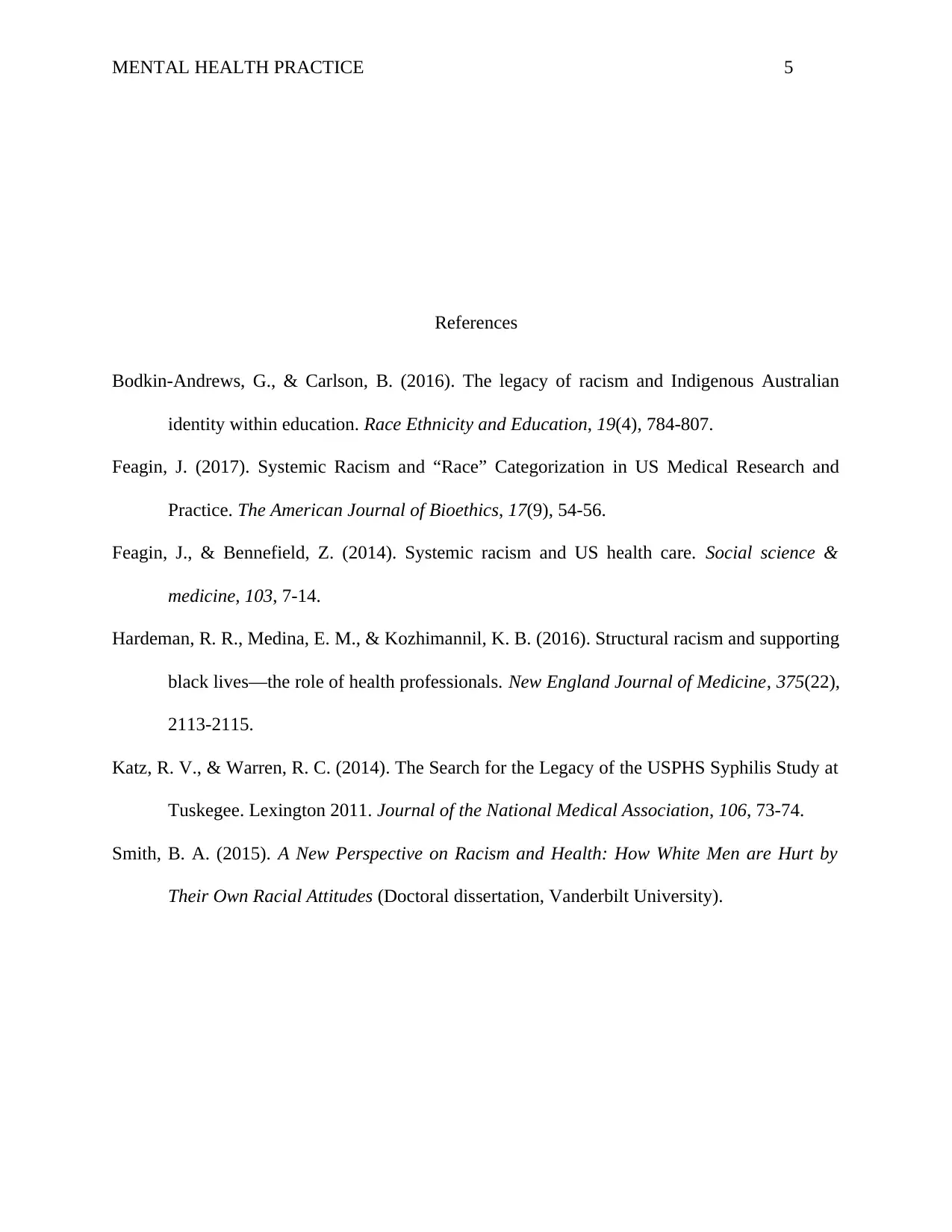
MENTAL HEALTH PRACTICE 5
References
Bodkin-Andrews, G., & Carlson, B. (2016). The legacy of racism and Indigenous Australian
identity within education. Race Ethnicity and Education, 19(4), 784-807.
Feagin, J. (2017). Systemic Racism and “Race” Categorization in US Medical Research and
Practice. The American Journal of Bioethics, 17(9), 54-56.
Feagin, J., & Bennefield, Z. (2014). Systemic racism and US health care. Social science &
medicine, 103, 7-14.
Hardeman, R. R., Medina, E. M., & Kozhimannil, K. B. (2016). Structural racism and supporting
black lives—the role of health professionals. New England Journal of Medicine, 375(22),
2113-2115.
Katz, R. V., & Warren, R. C. (2014). The Search for the Legacy of the USPHS Syphilis Study at
Tuskegee. Lexington 2011. Journal of the National Medical Association, 106, 73-74.
Smith, B. A. (2015). A New Perspective on Racism and Health: How White Men are Hurt by
Their Own Racial Attitudes (Doctoral dissertation, Vanderbilt University).
References
Bodkin-Andrews, G., & Carlson, B. (2016). The legacy of racism and Indigenous Australian
identity within education. Race Ethnicity and Education, 19(4), 784-807.
Feagin, J. (2017). Systemic Racism and “Race” Categorization in US Medical Research and
Practice. The American Journal of Bioethics, 17(9), 54-56.
Feagin, J., & Bennefield, Z. (2014). Systemic racism and US health care. Social science &
medicine, 103, 7-14.
Hardeman, R. R., Medina, E. M., & Kozhimannil, K. B. (2016). Structural racism and supporting
black lives—the role of health professionals. New England Journal of Medicine, 375(22),
2113-2115.
Katz, R. V., & Warren, R. C. (2014). The Search for the Legacy of the USPHS Syphilis Study at
Tuskegee. Lexington 2011. Journal of the National Medical Association, 106, 73-74.
Smith, B. A. (2015). A New Perspective on Racism and Health: How White Men are Hurt by
Their Own Racial Attitudes (Doctoral dissertation, Vanderbilt University).
1 out of 5
Related Documents
Your All-in-One AI-Powered Toolkit for Academic Success.
+13062052269
info@desklib.com
Available 24*7 on WhatsApp / Email
![[object Object]](/_next/static/media/star-bottom.7253800d.svg)
Unlock your academic potential
Copyright © 2020–2025 A2Z Services. All Rights Reserved. Developed and managed by ZUCOL.





